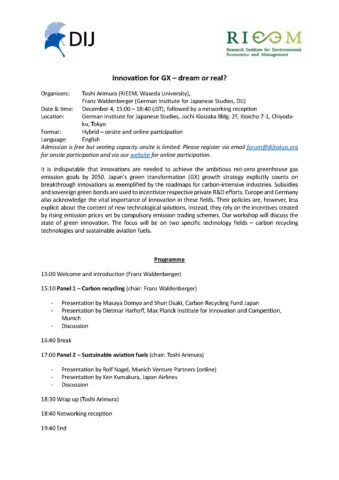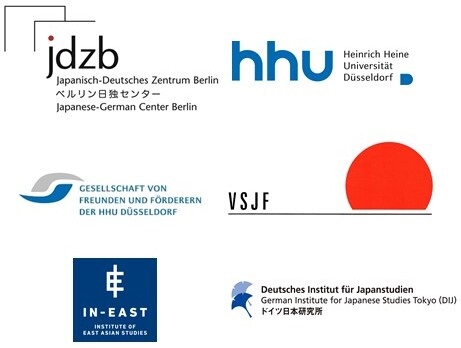イベント&アクティビティ
On-site Study Group “Marriage hunting” in Japan

“Marriage hunting” (konkatsu) is a multi-billion-yen industry comprising diverse dating services, from matchmaking apps to marriage agencies. With marriage remaining an important precursor to childbearing, the Japanese government has increasingly invested in “marriage support” to address population decline and aging. This talk draws on data from twenty-seven months of research in Japan, including more than 150 interviews with market professionals and their male and female clients, participant observation of marriage-hunting events, and documentary evidence, to explore the various collaborations between the private and public sector in marriage promotion efforts. The speaker suggests that these alliances constitute a new form of intimate governance which regulates how individuals enter and conceptualize romantic and familial relationships. Details and registration here
Online Study Group on Hypogamy and Traditional Household Attitudes

This presentation examines the relationship between educational hypogamy and life satisfaction within the realm of traditional norms in Japan. Educational hypogamy in this context refers to women who have attained a higher level of education than their husbands. Using Japanese Panel Survey of Consumers data the analysis reveals a significant negative correlation between hypogamy and life satisfaction in traditional households, where men often adhere to inflexible labor market roles and limited engagement in household chores. The findings suggest that hypogamous women experience lower life satisfaction, potentially due to increased burdens in balancing household and labor market responsibilities. In contrast, women in non-traditional households exhibit no such negative association, and in some cases, hypogamy positively correlates with life satisfaction. The talk contributes to discussions on gender roles, household economics, and well-being from a perspective rooted in household and labor economics. Details and registration here
Online Study Group explores Socio-Technical Futures in Japan
 This talk explores how laypeople and experts in Japan assess the role of technology in a desirable future. It will introduce two separate studies, spotlighting perceptions on two different streams of technology with two different stakeholder groups: laypeoples’ perceptions of generative artificial intelligence (genAI) and experts’ perspectives on cybernetic avatar (CA) technology. Both studies draw on a Research through Design (RtD) inspired Futuring approach, carried out through workshop formats. RtD refers to generating knowledge through the act of designing, while Futuring broadly refers to a set of approaches to strategically think about future developments and their (social) implications. This talk spotlights how the role of technology is anticipated by different stakeholders in Japan and sheds light on attitudes and values driving these socio-technical imaginations. Details and registration here
This talk explores how laypeople and experts in Japan assess the role of technology in a desirable future. It will introduce two separate studies, spotlighting perceptions on two different streams of technology with two different stakeholder groups: laypeoples’ perceptions of generative artificial intelligence (genAI) and experts’ perspectives on cybernetic avatar (CA) technology. Both studies draw on a Research through Design (RtD) inspired Futuring approach, carried out through workshop formats. RtD refers to generating knowledge through the act of designing, while Futuring broadly refers to a set of approaches to strategically think about future developments and their (social) implications. This talk spotlights how the role of technology is anticipated by different stakeholders in Japan and sheds light on attitudes and values driving these socio-technical imaginations. Details and registration here
Hybrid conference at DIJ discusses ‘Innovation for GX’
 It is indisputable that innovations are needed to achieve the ambitious net-zero greenhouse gas emission goals by 2050. Japan’s green transformation (GX) growth strategy explicitly counts on breakthrough innovations as exemplified by the roadmaps for carbon-intensive industries. Subsidies and sovereign green bonds are used to incentivize respective private R&D efforts. Europe and Germany also acknowledge the vital importance of innovation in these fields. Their policies are, however, less explicit about the content of new technological solutions. Instead, they rely on the incentives created by rising emission prices set by compulsory emission trading schemes. Bringing together five Japanese and German experts on carbon recycling technologies and sustainable aviation fuels, this conference will discuss the state of green innovation. This joint DIJ-RIEEM event takes places online and on site at the DIJ on December 4. Details and registration here
It is indisputable that innovations are needed to achieve the ambitious net-zero greenhouse gas emission goals by 2050. Japan’s green transformation (GX) growth strategy explicitly counts on breakthrough innovations as exemplified by the roadmaps for carbon-intensive industries. Subsidies and sovereign green bonds are used to incentivize respective private R&D efforts. Europe and Germany also acknowledge the vital importance of innovation in these fields. Their policies are, however, less explicit about the content of new technological solutions. Instead, they rely on the incentives created by rising emission prices set by compulsory emission trading schemes. Bringing together five Japanese and German experts on carbon recycling technologies and sustainable aviation fuels, this conference will discuss the state of green innovation. This joint DIJ-RIEEM event takes places online and on site at the DIJ on December 4. Details and registration here
Hybrid DIJ Study Group on Yakushima’s Complex Layers of Realities

At first glance, the island of Yakushima presents an appearance of peaceful stability, that of a nature preserved from human influence, embodied by millennial cedars. Yet, beneath this layer other realities emerge – different ways of inhabiting and transforming this territory by various stakeholders at different times. These complex layers raise questions about their potential interactions and the risks of disruption. In other words, how can the different stakeholders living on the island continue to coexist in a sustainable way? Referring to locals and their activities (tourism, industry, forestry, etc.), tourists, non-human animals, plants, all other forms of living entities, kami and other beings of the supernatural world, as well as symbols, this presentation aims to better understand how these relationships form a cohesive collective, which could be described as an eco-semiosphere. Details and registration here
DIJ co-organises VSJF Annual Conference on Sustainability in Japan
 Making human activity on Earth sustainable is currently the greatest challenge of mankind. Ever since the United Nations adopted the Sustainable Development Goals (SDGs) in 2015, the topic has gained world-wide popularity, but what sustainability means, how it can be achieved, how it is politically negotiated, and which actors are involved differs widely across the world. Focusing on economic, societal, and political perspectives, the purpose of this conference is to gain a better understanding of how issues of sustainability are understood, framed and pursued by different actors in Japan. Speakers include DIJ researchers Franz Waldenberger, Barbara Holthus, Isaac Gagné, Sebastian Polak-Rottmann, and Nicole M. Mueller. The conference is co-organised by Barbara Holthus and DIJ alumni Harald Conrad (Düsseldorf) and Axel Klein (Duisburg). It takes places at the JDZB in Berlin from November 15-17, 2024. Details and registration here
Making human activity on Earth sustainable is currently the greatest challenge of mankind. Ever since the United Nations adopted the Sustainable Development Goals (SDGs) in 2015, the topic has gained world-wide popularity, but what sustainability means, how it can be achieved, how it is politically negotiated, and which actors are involved differs widely across the world. Focusing on economic, societal, and political perspectives, the purpose of this conference is to gain a better understanding of how issues of sustainability are understood, framed and pursued by different actors in Japan. Speakers include DIJ researchers Franz Waldenberger, Barbara Holthus, Isaac Gagné, Sebastian Polak-Rottmann, and Nicole M. Mueller. The conference is co-organised by Barbara Holthus and DIJ alumni Harald Conrad (Düsseldorf) and Axel Klein (Duisburg). It takes places at the JDZB in Berlin from November 15-17, 2024. Details and registration here
Hybrid DIJ Study Group on Looting of Post-Surrender Japan

Following the American conquest of Okinawa in June 1945, the Japanese military anticipated that the Allies planned to invade the four main islands of Japan. But to everyone’s surprise, no such invasion came. Instead, the war abruptly ended on August 15, 1945, without a single Allied soldier setting foot on mainland Japan. Between August 15 and late September 1945, morale and discipline within military units across Japan underwent a wholesale collapse. This talk explores how soldiers and sailors within Japan reacted to defeat during the critical weeks after Japan’s surrender. Using data from Japanese military police (Kenpeitai) reports, the talk argues that looting by demobilized servicemen and their officers profoundly tarnished the Japanese military’s reputation in the eyes of the public and severed what few bonds remained between the Imperial Japanese military and Japan’s people. Details and registration here
Hybrid DIJ Forum on ‘Omnilateralism in an Interpopular World’
 After a century of Western-inspired and hackneyed multilateralism, its much criticized more than 75-year-old stronghold, the UN, needs a new narrative: interpopular omnilateralism. Instead of originating in the hardly definable construct of the “nation” and hence being “international”, the UN Charter is rather based on the people, thus it is interpopular from its inception. The proper vehicle to reach this aim of a wider community of people is omnibus – for and by all -, firstly, to widen the way for input of more ideas and good practices by non-Western people, and secondly, to include non-state actors as legitimate stakeholders in global governance. At this DIJ Forum, Wolfgang Pape will introduce the concept omnilateralism and discuss it in the context of democracy and global governance. Akio Kawato will offer his comments, followed by a Q&A session and a small reception. Details and registration here
After a century of Western-inspired and hackneyed multilateralism, its much criticized more than 75-year-old stronghold, the UN, needs a new narrative: interpopular omnilateralism. Instead of originating in the hardly definable construct of the “nation” and hence being “international”, the UN Charter is rather based on the people, thus it is interpopular from its inception. The proper vehicle to reach this aim of a wider community of people is omnibus – for and by all -, firstly, to widen the way for input of more ideas and good practices by non-Western people, and secondly, to include non-state actors as legitimate stakeholders in global governance. At this DIJ Forum, Wolfgang Pape will introduce the concept omnilateralism and discuss it in the context of democracy and global governance. Akio Kawato will offer his comments, followed by a Q&A session and a small reception. Details and registration here





 Open Access
Open Access
